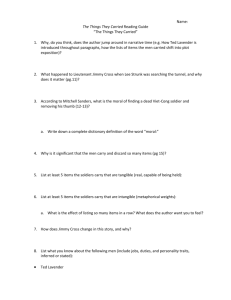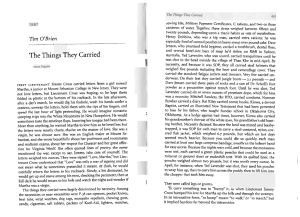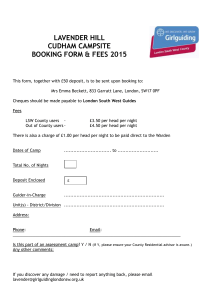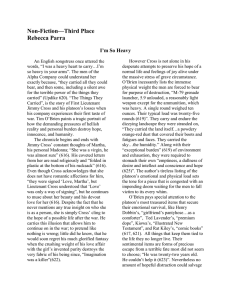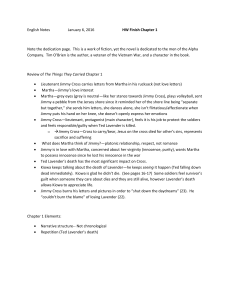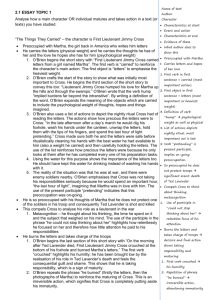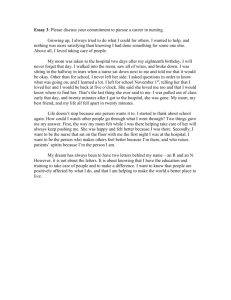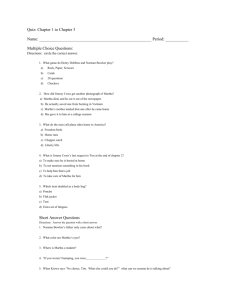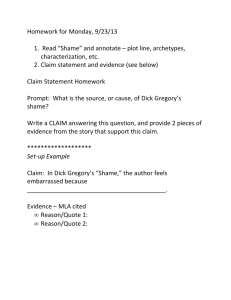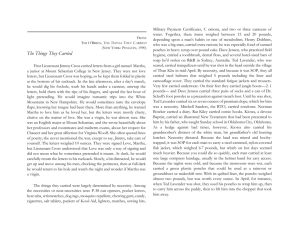The Things They Carry - Parma City School District
advertisement
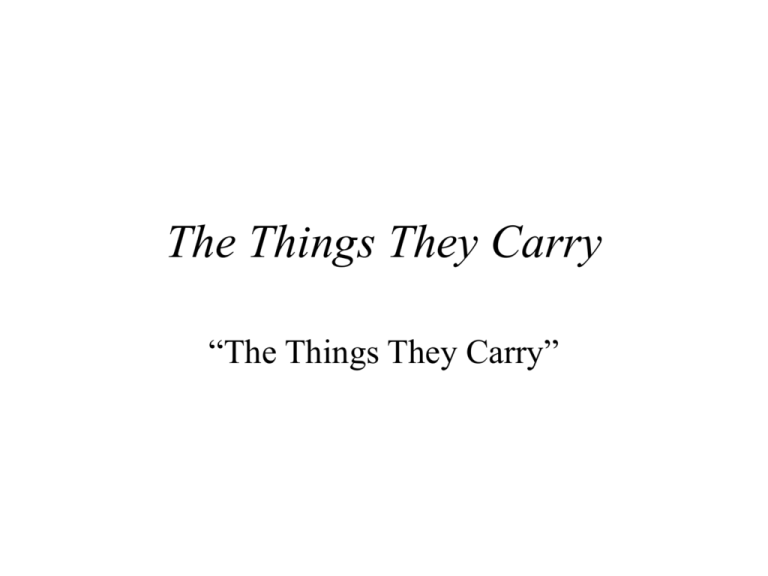
The Things They Carry “The Things They Carry” Tangible Items Picture of Martha: “More than anything, he wanted Martha to love him as loved her” (1) Hope of a better life he may return to Reassures his humanity Poncho “each carried a green plastic poncho that could be used as a raincoat or ground sheet or makeshift tent. With its quilted liner, the poncho weighed almost 2 pounds, but it was worth every ounce. In April, for instance, when Ted Lavender was shot, they used his poncho to wrap him up, then to carry him across the paddy, then to life him into the chopper that took him away.” (3) » Items convey deeper meaning and emotions for soldiers » Hope, fear, shame and guilt represented in items Intangible Items “They carried their own lives. The pressures were enormous” (15). “-and for all the ambiguities of Vietnam, all the mysteries and unknowns, there was at least the single abiding certainty that they would never be at a loss for things to carry” (16) • “They carried all the emotional baggage of men who might die. Grief, terror, love, longing- these were intangibles, but the intangibles had their own mass and specific gravity, they had tangible weight” (21). – “Carry” metaphor for psychological burdens the soldiers had to carry • no way to understand or rationalize death and killing • Items contain meaning beyond immediate use • intensifies the emotion felt Intangible Items • “They had no sense of strategy or mission. They searched the villages without knowing what to look for, not caring, kicking over jars of rice, frisking children and old men, blowing tunnels, sometimes setting fires and sometimes not, then forming up and moving on to the next village, then other villages, where it would always be the same.” (15) – Do not know why they are fighting – War holds no importance for them – Feel missions are pointless but must follow commander Shame • “He wished he could find some great sadness, or even anger, but the emotion wasn’t there and he couldn’t make it happen. Mostly he felt pleased to be alive” (18). • “They were afraid of dying, but they were even more afraid to show it” (20). – they carry guilt – fear being a coward and others knowing it – hide fear of death and relief of others’ deaths Shame • “They carried the soldier’s greatest fear, which was the fear of blushing. Men killed, and died, because they were embarrassed not to. It was what had brought them to war in the first place, nothing positive, no dreams of glory or honor, just to avoid the blush of dishonor.” (21) – Fight in war because ashamed not to • Superiors, parents, government, peers • Their mere presence in war makes them participants in the deaths of other individuals Ted Lavender • “…then Ted Lavender was shot in the head on his way back from peeing. He lay with his mouth open. The teeth were broken. There was a swollen black bruise under his left eye. The cheekbone was gone. Oh shit, Rat Kiley said, the guy’s dead. The guy’s dead, which seemed profound- the guy’s dead. I mean really.” (12-13) – Realities of war – Tone is blunt, matter-of-fact – Emotionally numb to atrocities of war Lieutenant Cross • Reaction to Lavender’s death “Lt. Cross felt himself trembling. He tried not to cry…He felt shame. He hated himself. He had loved Martha more than his men, and as a consequence Lavender was now dead, and this was something he would have to carry like a stone in his stomach for the rest of the war” (16). Feels he is negligent Something he will carry forever Lieutenant Cross • How it changes him – “He was realistic about it. There was that new hardness in his stomach. He loved her but he hated her. No more fantasies, he told himself” (24). • blames himself • won’t happen again • “…but Lieutenant Jimmy Cross reminder himself that his obligation was not to be loved but to lead” (25-26). – uses hate and anger to not feel emotion – burns letters – how experience has affected him mentally
